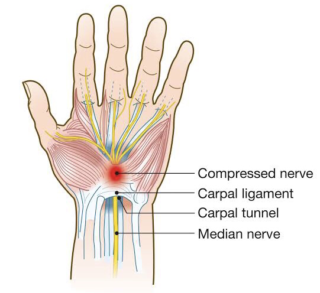CONDITIONS
Medical Conditions we treat:
HEAD
NECK
SHOULDER
WRIST
HIP
KNEE
ANKLE
BACK
ELBOW

Medical Conditions we treat:
- Musculoskeletal Conditions
Joints & Bones
Frozen Shoulder (Adhesive Capsulitis)
Bursitis
Dislocated Shoulder
Post Surgical Rehabilitation
Knee Pain
Osteoarthritis
Condramalacia Patella
Joint Stiffness
Neck & Spine
Neck Pain & Stiffness
Spondylitis
Low Back Pain
Sciatica
Degenerative Disc Disease(DDD)
Herniated Discs(Bulging Discs)/Slipped Disc
Spondylosis
Scoliosis
Piriformis Syndrome
Posture problems
Muscles
Spasm
Fibromyalgia
Rotator Cuff Injuries
De Quervain’s tenosynovitis
Trigger Finger
- Neurological conditions
- Sports injury conditions
Carpal Tunnel Syndrome
Carpal tunnel syndrome is a painful disorder of the wrist and hand. The carpal tunnel is a narrow tunnel formed by the bones and other tissues of your wrist. This tunnel protects your median nerve. The median nerve helps you move your thumbs and the first 3 fingers on each hand.
Carpal tunnel syndrome occurs when other tissues in the carpal tunnel (such as ligaments and tendons) get swollen or inflamed. When they do, they press against the median nerve. That pressure can make part of your hand hurt or feel numb.

Causes
Doing the same hand movements over and over can lead to carpal tunnel syndrome. It’s most common in people whose jobs require pinching or gripping with the wrist held bent. People at risk include people who use computers, carpenters, grocery checkers, assembly-line workers, meat packers, musicians, and mechanics. Hobbies such as gardening, needlework, golfing, and canoeing can sometimes bring on the symptoms.
Women are more likely to develop carpal tunnel syndrome than men. It also tends to be hereditary. This means it runs in families.
Carpal tunnel syndrome may also be caused by an injury to the wrist, such as a fracture. Or it may be caused by a disease such as diabetes, rheumatoid arthritis, or thyroid disease. Carpal tunnel syndrome is also common during the last few months of pregnancy.
Symptoms
The symptoms of carpal tunnel syndrome include the following:
- Numbness or tingling in your hand and fingers, especially the thumb, index, and middle fingers.
- Pain in your wrist, palm, or forearm. You may shake or rub your hand to get relief.
- More numbness or pain at night than during the day. It may be so bad that it wakes you up.
- Pain that increases when you use your hand or wrist more.
- Trouble gripping objects, such as a doorknob or the steering wheel of a car.
- Weakness in your thumb.
Diagnosis
Your doctor will probably ask you about your symptoms. He or she may examine you and ask you how you use your hands. Your doctor may also do these tests:
- Your doctor may tap the inside of your wrist. You may feel pain or a sensation that feels like an electric
- Your doctor may ask you to bend your wrist down for 1 minute to see if this causes symptoms.
Your doctor may order a nerve conduction test or an electromyography (EMG) test. They use these tests to see whether the nerves and muscles in your arm and hand show the typical effects of carpal tunnel syndrome.
Prevention
You can take steps to prevent carpal tunnel syndrome. The following actions may help to prevent it:
- Lose weight if you’re overweight.
- Get treatment for any disease you have that may cause carpal tunnel syndrome.
- If you do the same tasks over and over with your hands, try not to bend, extend, or twist your hands for long periods of time.
- Don’t work with your arms too close or too far from your body.
- Don’t rest your wrists on hard surfaces for long periods of time.
- Switch hands during work tasks.
- Make sure the tools you use aren’t too big for your hands.
- Take regular breaks from repeated hand movements to give your hands and wrists time to rest.
- If you use a keyboard a lot, adjust the height of your chair so that your forearms are level with your keyboard, and you don’t have to flex your wrists to type.

